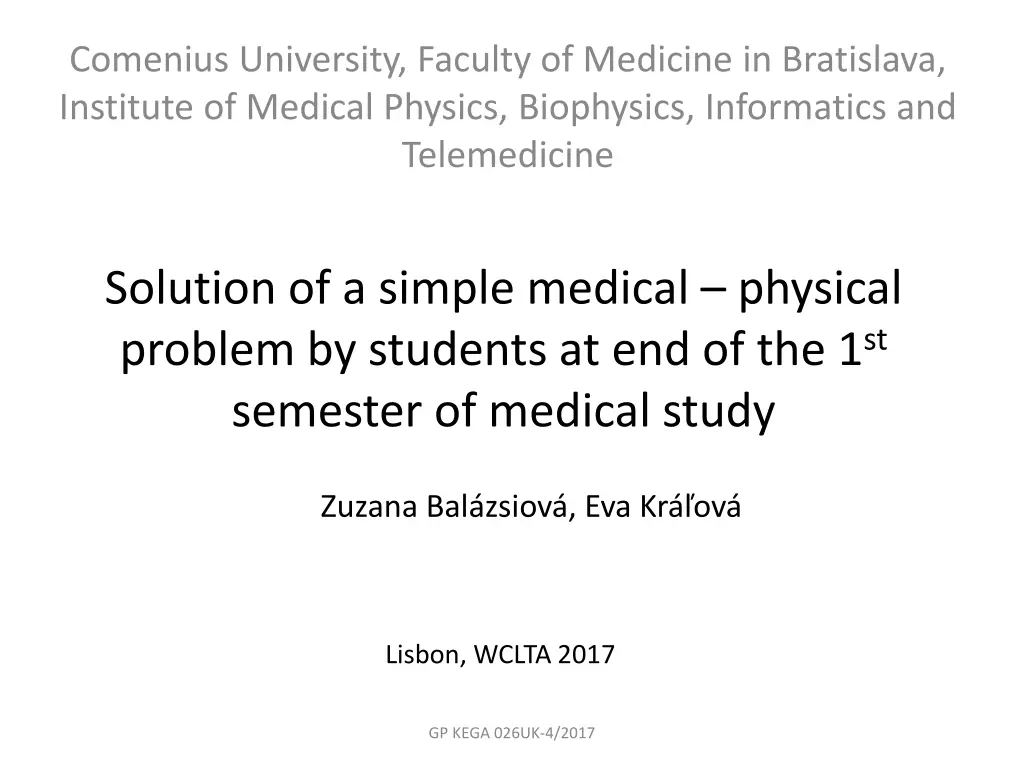
Insights into the Challenges of Teaching Biophysics in Medical Education
Discover the complexities faced in teaching biophysics to medical students, examining student responses and factors influencing learning outcomes. Explore solutions to enhance the educational experience.
Download Presentation

Please find below an Image/Link to download the presentation.
The content on the website is provided AS IS for your information and personal use only. It may not be sold, licensed, or shared on other websites without obtaining consent from the author. If you encounter any issues during the download, it is possible that the publisher has removed the file from their server.
You are allowed to download the files provided on this website for personal or commercial use, subject to the condition that they are used lawfully. All files are the property of their respective owners.
The content on the website is provided AS IS for your information and personal use only. It may not be sold, licensed, or shared on other websites without obtaining consent from the author.
E N D
Presentation Transcript
Comenius University, Faculty of Medicine in Bratislava, Institute of Medical Physics, Biophysics, Informatics and Telemedicine Solution of a simple medical physical problem by students at end of the 1st semester of medical study Zuzana Bal zsiov , Eva Kr ov Lisbon, WCLTA 2017 GP KEGA 026UK-4/2017
Background Public opinion: (Bio)physics = difficulty + uselessness Reality: Medical (bio)physics = fundamental subject in medicine Root of problem - the way of teaching of physics at most secondary schools: neglect of interdisciplinary relationships absence of practical exercises absence of individual approach for students GP KEGA 026UK-4/2017
Biophysics on Medical Faculty (teaching in the 1st semester) General Medicine Dentistry Lectures: 24 lessons Practical training: 36 lessons Lectures: 24 lessons Practical training: 24 lessons Weak spot - very large groups on practical exercises - the content of lectures is not in line with practical exercises GP KEGA 026UK-4/2017
Respondents and problem men women together 40 89 129 Activity before studying of medicine Number of students Study of medicine immediatelly after graduation 79 Only some study 30 Some study + work 7 Only work 7 At home 6 Writen solution to the problem: At first sight a stethoscope appears to be in good condition (bell, diaphragm, and transfer system) but you do not hear anything on auscultation of breathing. Give a reason. GP KEGA 026UK-4/2017
Analysis of responses Patient s health Physical principle Measuring technique Quantitative analysis Qualitative analysis Responses (frequency of answer regardless of the nature phenomenon) (what has effect on student s answer ) GP KEGA 026UK-4/2017
Results 1. The impact of student sex on the number of responses (p = 0.35) 100% 80% Number of students 3 reasons 60% 2 reasons 1 reason 40% no reason 20% 0% women men GP KEGA 026UK-4/2017
2. The impact of students activity before studying of medicine on the number of answers (regardless to the nature phenomenon) (p = 0.003) no reason 1 reason 2 reasons 3 reasons 100% 80% Number of students 60% 40% 20% 0% GP KEGA 026UK-4/2017
3. The impact of student sex on the contents of answers (p = 0.02) 100% 80% patient s health Number of students 60% measuring technique physical principle 40% 20% 0% women men 4. The impact of student s activities before studying of medicine on the contents of answers (p = 0.71) GP KEGA 026UK-4/2017
Summary and conclusion Lack of ability of students to solve problem task effectively and creatively (only 28% of students wrote more than 1 reason, 13% - no answer) Quantitative result of solving problem by students depend on their past experiences (p =0.003) but no on gender (p = 0,35) Qualitative result of solving problem depend on gender of students (p = 0.02), but no on student s activities before study of medicine (p = 0,71) GP KEGA 026UK-4/2017
Recommendation to use motivational and provocative forms of teaching creative atmosphere in teaching. emphasis on cross-curricular relationships (all subjects taught are related). understand student s thinking (questions why). student's (un)success must not be conditional on (un)success in another subject (excellent in physics only if he/she has excellent math) GP KEGA 026UK-4/2017
Thank you for your attention GP KEGA 026UK-4/2017
4. The impact of students activities before studying of medicine on the contents of answers (p = 0.71) Number of students (%) Category of responses Only some study Some study + work Only work At home graduation together Physical principle 20.53 7.14 3.57 0.89 1.78 33.91 Measuring technique 41.96 16.07 4.47 1.79 3.57 67.68 Patient s health 13.39 0.00 1.78 0.89 0.00 16.06 Some students have provided more answers in different categories sum is greater than 100% GP KEGA 026UK-4/2017
